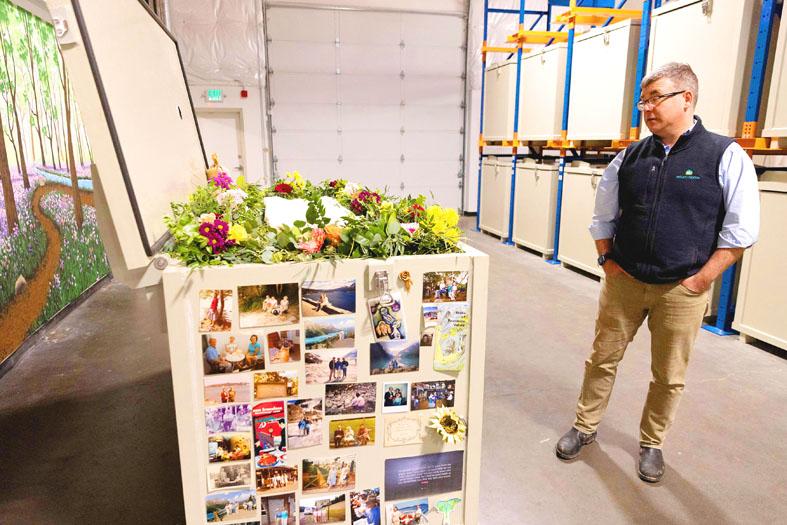A woodpecker settled on a branch overhead as Cindy Armstrong stood near a grouping of trees, gazing at a patch of soil that contained bits of her son’s composted remains. Armstrong is one of a growing number of Americans embracing environmentally low-impact burials for their loved ones.
Armstrong said that her son Andrew insisted on the so-called “terramation” process after Washington state became the first in the US to make the practice a legal alternative to cremation in 2019.
“I was mortified,” she told reporters. “Now that I’ve gone through the process, I’m all for this. I will be terramated.”

Photo: AFP
The composted remains of Andrew, who died from cancer last year at age 36, have joined remains of dozens of others on a hillside in the town of Kent, in the Seattle area, set aside as their resting place.
Thousands of Americans choose “green” burial — which eschews chemical embalming as well as materials like concrete or metal which come with climate-harming carbon footprints — each year.
“He wanted to give back to nature,” Armstrong said on a recent morning, with trees and plants taking root in the verdant, wet hillside.
The land is owned by Return Home, a start-up that has performed 40 terramations since launching in the neighboring city of Auburn seven months ago.
“It’s like these people are teaching us to die better,” Return Home founder and chief Micah Truman said as he showed AFP a warehouse-sized room with racks of metal containers referred to as “vessels,” which hold remains during the 60-day, sealed decomposition process.
The space was brightly lit and upbeat music played. Loved ones who visit during those 60 days can pick songs celebrating the lives of those they have lost.
Bodies in vessels are not embalmed, and family members are invited to add flowers or compostable mementos to the straw and other natural ingredients used in the process.
The amount of organic material added to the vessels to help in the composting process is about triple the body weight of the human remains inside, resulting in hundreds of kilograms of compost being produced.
No enzymes are added, the company said.
Sensors tracking moisture, temperature and air flow synched with a computer to optimize conditions for decomposition.
Halfway through the process, bones are removed and ground into fine pieces before being put back in the vessel to finish composting.
The result looks and feels like ordinary mulch.
Families can take as much or as little as they want, with the rest spread at “The Woodland” in Kent.
Local zoning rules restrict the land — which was once strewn with ruined vehicles, some scarred by bullets — from ever being built on.
Body composting is part of an eco-friendly funeral trend gaining momentum around the world, according to Green Burial Council president Edward Bixby.
“Basically, it’s going back to the Earth as we came; dust to dust,” said Bixby, who opened his first Destination Destiny natural burial cemetery five years ago in New Jersey and has expanded to 10 US states.
The council has more than 400 members, some outside the US, Bixby said.
A single cremation burns about as much fuel as a full tank of a large sports utility vehicle, the Green Burial Council said.
Return Home body composting is priced at US$5,000, on a par with cremation. Traditional funerals can cost double or triple that.
Other green burial options include simply wrapping a body in a biodegradable shroud or putting it in a wooden box and burying it. Silicon Valley-based Coeio sells an Infinity Burial Suit that contains mushroom mycelium in a recipe intended to “neutralize toxins found in the body and transfer nutrients to plant life.”
Green burials come with a natural approach to death itself.
Loved ones can be involved with preparing bodies for burial, seeing the departed as being a part of life that continues on.
“Horror movies and things like that have made people afraid of death and dying,” Bixby said. “We have always had the ability to care for our loved ones in death, we just lost touch with it.”

PARLIAMENT CHAOS: Police forcibly removed Brazilian Deputy Glauber Braga after he called the legislation part of a ‘coup offensive’ and occupied the speaker’s chair Brazil’s lower house of Congress early yesterday approved a bill that could slash former Brazilian president Jair Bolsonaro’s prison sentence for plotting a coup, after efforts by a lawmaker to disrupt the proceedings sparked chaos in parliament. Bolsonaro has been serving a 27-year term since last month after his conviction for a scheme to stop Brazilian President Luiz Inacio Lula da Silva from taking office after the 2022 election. Lawmakers had been discussing a bill that would significantly reduce sentences for several crimes, including attempting a coup d’etat — opening up the prospect that Bolsonaro, 70, could have his sentence cut to

A plan by Switzerland’s right-wing People’s Party to cap the population at 10 million has the backing of almost half the country, according to a poll before an expected vote next year. The party, which has long campaigned against immigration, argues that too-fast population growth is overwhelming housing, transport and public services. The level of support comes despite the government urging voters to reject it, warning that strict curbs would damage the economy and prosperity, as Swiss companies depend on foreign workers. The poll by newspaper group Tamedia/20 Minuten and released yesterday showed that 48 percent of the population plan to vote

A powerful magnitude 7.6 earthquake shook Japan’s northeast region late on Monday, prompting tsunami warnings and orders for residents to evacuate. A tsunami as high as three metres (10 feet) could hit Japan’s northeastern coast after an earthquake with an estimated magnitude of 7.6 occurred offshore at 11:15 p.m. (1415 GMT), the Japan Meteorological Agency (JMA) said. Tsunami warnings were issued for the prefectures of Hokkaido, Aomori and Iwate, and a tsunami of 40cm had been observed at Aomori’s Mutsu Ogawara and Hokkaido’s Urakawa ports before midnight, JMA said. The epicentre of the quake was 80 km (50 miles) off the coast of

RELAXED: After talks on Ukraine and trade, the French president met with students while his wife visited pandas, after the pair parted ways with their Chinese counterparts French President Emmanuel Macron concluded his fourth state visit to China yesterday in Chengdu, striking a more relaxed note after tough discussions on Ukraine and trade with Chinese President Xi Jinping (習近平) a day earlier. Far from the imposing Great Hall of the People in Beijing where the two leaders held talks, Xi and China’s first lady, Peng Liyuan (彭麗媛), showed Macron and his wife Brigitte around the centuries-old Dujiangyan Dam, a World Heritage Site set against the mountainous landscape of Sichuan Province. Macron was told through an interpreter about the ancient irrigation system, which dates back to the third century